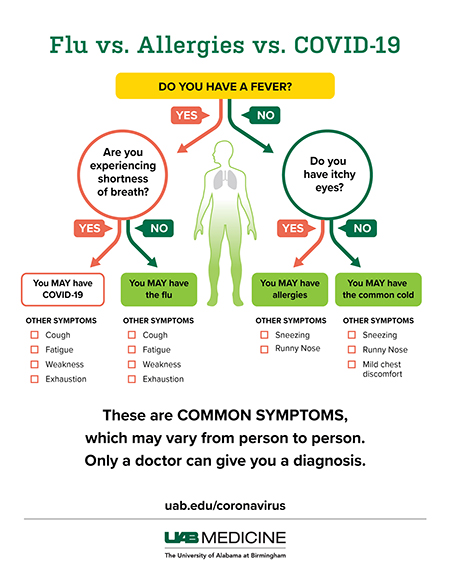
Do I have it? Can I get it from my pet? How do I clean properly? We have answers to help you handle the information overload. And, you can always call 211 for information about how to stay safe, financial assistance, unemployment,
donations, food, and other non-medical needs.
New Jersey has a website with answers to lots of your questions here: https://covid19.nj.gov/
What are the coronavirus symptoms?
The classic symptoms of covid-19 are:
- Fever
- Cough
- Shortness of breath
Visit the Centers for Disease Control (CDC) website for more.

Is it allergies, cold, or coronavirus?
The novel coronavirus has some symptoms that overlap with other common seasonal ailments like colds, flu, and allergies. With anxiety levels high, it can be difficult to avoid the urge to go get tested at the first sneeze. The right thing to do if you’re not feeling well is to call your primary care doctor, but for a basic overview see the image right to help and check out some useful resources:
- UAB News – “Sorting out symptoms of COVID-19, influenza, colds and allergies“
- The New York Times – “Your Nose Itches. Is It Allergies, Flu or the Coronavirus?”
- Science Alert – “Sneezing? According to Data, That’s Unlikely to Be a COVID-19 Symptom”
How do I protect myself against coronavirus?
The CDC recommends three key approaches listed below.
Wear a mask:
- Masking is critical to reducing the spread of covid-19 and should be practiced whenever in the presence of other people outside your home. It is required in all Federal spaces and in all indoor shopping areas in New Jersey.
Wash your hands:
- Wash your hands often with soap and water for at least 20 seconds especially after you have been in a public place, or after blowing your nose, coughing, or sneezing.
- If soap and water are not readily available, use a hand sanitizer that contains at least 60% alcohol. Cover all surfaces of your hands and rub them together until they feel dry.
- Avoid touching your eyes, nose, and mouth with unwashed hands.
Avoid close contact:
- Avoid close contact with people who are sick
- Put distance between yourself and other people of at least six feet.
For more information see the CDC website.
What should I do if someone in my house is sick?
The following information comes from the CDC website. Read the full post here for more details.
- Have the person stay in one room, away from other people, including yourself, as much as possible.
- If possible, have them use a separate bathroom.
- Avoid sharing personal household items, like dishes, towels, and bedding
- If facemasks are available, have them wear a facemask when they are around people, including you.
- It the sick person can’t wear a facemask, you should wear one while in the same room with them, if facemasks are available.
- If the sick person needs to be around others (within the home, in a vehicle, or doctor’s office), they should wear a facemask.
- Wash your hands often with soap and water for at least 20 seconds, especially after interacting with the sick person. If soap and water are not readily available, use a hand sanitizer that contains at least 60% alcohol. Cover all surfaces of your hands and rub them together until they feel dry.
- Avoid touching your eyes, nose, and mouth.
- Every day, clean all surfaces that are touched often, like counters, tabletops, and doorknobs
- Use household cleaning sprays or wipes according to the label instructions.
- Wash laundry thoroughly.
- If laundry is soiled, wear disposable gloves and keep the soiled items away from your body while laundering. Wash your hands immediately after removing gloves.
- Avoid having any unnecessary visitors.
- For any additional questions about their care, contact their healthcare provider or state or local health department.
How do I clean and disinfect surfaces and other items?
The following information comes from the New Jersey Department of Health (DOH):
How to Clean and Disinfect Surfaces
- If surfaces are dirty, they should be cleaned using a detergent or soap and water prior to disinfection
- For disinfection, diluted household bleach solutions, alcohol solutions with at least 70% alcohol, and most common EPA-registered household disinfectants should be effective.
How to Clean Linens, Clothing and Other items that go in the Laundry
- Do not shake dirty laundry; this minimizes the possibility of dispersing the virus through the air.
- Wash items as appropriate in accordance with the manufacturer’s instructions. If possible launder items using the warmest appropriate water setting for the items and dry items completely. Dirty laundry that has been in contact with an ill person can be washed with other people’s items.
- Clean and disinfect hampers or other carts for transporting laundry.
Can I get covid-19 from my pet?
There is no reason at this time to think that any animals, including pets, in the United States might be a source of infection with this new coronavirus that causes COVID-19. To date, CDC has not received any reports of pets or other animals becoming sick with COVID-19 in the United States.
Pets have other types of coronaviruses that can make them sick, like canine and feline coronaviruses. These other coronaviruses cannot infect people and are not related to the current COVID-19 outbreak.
However, since animals can spread other diseases to people, it’s always a good idea to practice healthy habits around pets and other animals, such as washing your hands and maintaining good hygiene. For more information on the many benefits of pet ownership, as well as staying safe and healthy around animals including pets, livestock, and wildlife, visit CDC’s Healthy Pets, Healthy People website. (NJ DOH, March 23, 2020)
CLOSE CONTACT INFORMATION
Note: This information comes directly from the Department of Health.
What if I have had close contact with someone who has confirmed covid-19?
If you are identified as a close contact to someone with COVID-19, you may have been told this by your healthcare provider, your employer, your local health department or the person themselves. In general, close contact means being within 6 feet of a person for longer than 10 minutes. It is currently thought that close contacts of people who have COVID-19 are at higher risk of getting the virus than the general public. Some examples of close contact include:
- Living in the same household and sharing common spaces (bathrooms, kitchen, living spaces, etc.) with a sick person with COVID-19
- Caring for a sick person with COVID-19
- Being in direct contact with secretions from a sick person with COVID-19 which could include being coughed on, kissing, sharing utensils, etc.
What if I’m a close contact to someone with COVID-19 but I’m not sick and I don’t have symptoms?
If you have not been a close contact to someone with COVID-19 then you are likely to be at lower risk for infection. However, you should continue to monitor your health for symptoms. If you feel feverish or develop cough or difficulty breathing, you should limit contact with others and seek advice by telephone from a healthcare provider to determine whether medical evaluation is needed.
You should stay in self-quarantine at home and monitor your health for fever, cough, shortness o
breath or other symptoms during the 14 days after the last day you were in close contact with the sick person with COVID-19. You should not go to work or school and should avoid public places during this time period. If the person with COVID-19 lives in your home, do your best to separate yourself from them until they are taken off their home isolation instructions. If you cannot separate yourself from them and continue to have close contact then you will need to remain at home and self-quarantined for 14 days after the person with COVID-19 is released from their home isolation.
If, during this 14-day period, you get sick with fever, cough or shortness of breath (even if your
symptoms are very mild), you should isolate yourself at home and stay away from other people. If you feel you need additional medical evaluation or have any of the following conditions that may increase your risk for a serious infection —age 60 years or over, are pregnant, or have medical conditions—contact your physician’s office and tell them that you were exposed to someone with COVID-19. They may want to monitor your health more closely or test you for COVID-19. If you need to see a healthcare provider, call ahead to the office and tell them you were a close contact to someone with COVID-19. If you experience a medical emergency and need to call an ambulance, dial 9-1-1 and alert dispatch that you are a close contact to a person with COVID-19 and are currently under quarantine.
What if I have been in close contact and have symptoms, but I don’t have my test results yet?
If you have symptoms and you’ve been tested but don’t have the results you should remain in home isolation and separate yourself from others until you receive your results. This includes eliminating close contact with others in the house, not traveling or attending public gatherings, and not leaving home except to seek medical care. Practice good hand hygiene and clean and disinfect high-touch surfaces daily in household common areas (e.g. tables, hard-backed chairs, doorknobs, light switches, remotes, handles, desks, toilets, sinks, phones). Depending on your results follow the additional guidance below.
What if I tested negative, but still feel sick?
If you test negative for COVID-19 but still have symptoms, it is likely you may have another respiratory virus. You should continue to follow similar guidance to isolate yourself from others, practice good hand hygiene and clean and disinfect surfaces in the home. You should not return to work or school until 72 hours after your fever has ended without the use of fever-reducing medications and your other symptoms have improved.
What if I test positive for COVID-19?
If you test positive for COVID-19, don’t panic. Many people who have COVID-19 have mild illness and can be managed at home without needing to be in the hospital or receive additional care. Your
healthcare provider may contact you to ask additional questions. You may be contacted by your local health department to interview you about where you may have gone and who may have had close contact with you while you were ill. This information will be helpful to them in determining if others around you should be evaluated for COVID-19 and should seek care. After your diagnosis you will be asked to isolate yourself at home until 7 days after you first developed symptoms AND 72 hours (3 days) after your fever has ended without the use of fever-reducing medications and your symptoms have significantly improved (whichever period is longer). If you have trouble figuring out when to stop isolation, contact your local health department or your healthcare provider. If you are in home isolation and your symptoms are worsening, contact your healthcare provider and seek advice. If you are under home isolation, experience a medical emergency, and need to call an ambulance, dial 9-1-1 and alert dispatch that you have tested positive for COVID-19 and are currently isolating at home.
What if I’m a close contact but don’t meet the criteria for testing?
If you aren’t tested but still have symptoms, it is possible you may have COVID-19 or another
respiratory virus. You should continue to isolate yourself from others, practice good hand hygiene and clean and disinfect surfaces in the home. If you or your healthcare provider have a high suspicion of COVID-19, you may be advised to follow the same home-isolation guidance as people who test positive for COVID-19 (see above).

